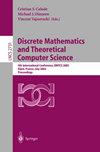Cops and Robbers on Dynamic Graphs: Offline and Online Case
IF 0.5
4区 数学
引用次数: 0
Abstract
We examine the classic game of Cops and Robbers played on models of dynamic graphs, that is, graphs evolving over discrete time steps. At each time step, a graph instance is generated as a subgraph of the underlying graph of the model. The cops and the robber take their turns on the current graph instance. The cops win if they can capture the robber at some point in time. Otherwise, the robber wins. In the offline case, the players are fully aware of the evolution sequence, up to some finite time horizon T. We provide a O(n 2k+1 T) algorithm to decide whether a given evolution sequence for an underlying graph with n vertices is k-cop-win via a reduction to a reachability game. In the online case, there is no knowledge of the evolution sequence, and the game might go on forever. Also, each generated instance is required to be connected. We provide a nearly tight characterization for sparse underlying graphs, i.e., with at most linear number of edges. We prove λ + 1 cops suffice to capture the robber in any underlying graph with n − 1 + λ edges. Further, we define a family of underlying graphs with n−1+λ edges where λ−1 cops are necessary (and sufficient) for capture.动态图表上的警察和劫匪:离线和在线案例
我们研究了在动态图模型上玩的经典游戏Cops and Robbers,即在离散时间步上进化的图。在每个时间步骤中,将生成一个图实例作为模型的底层图的子图。警察和抢劫犯轮流使用当前的图形实例。如果警察能在某个时间点抓住抢劫犯,他们就赢了。否则,强盗就赢了。在离线情况下,玩家完全知道进化序列,直到某个有限的时间范围T。我们提供了一个O(n 2k+1 T)算法,通过还原到可达性博弈来决定具有n个顶点的底层图的给定进化序列是否为k-co -win。在网络游戏中,玩家不知道进化顺序,游戏可能会永远进行下去。此外,需要连接每个生成的实例。我们为稀疏底层图提供了一种近似紧密的表征,即边最多为线性数。我们证明了在任意有n−1 + λ条边的底层图中,λ + 1个条子足以捕获抢劫犯。进一步,我们定义了一组具有n−1+λ条边的底层图,其中λ−1条边对于捕获是必要的(和充分的)。
本文章由计算机程序翻译,如有差异,请以英文原文为准。
求助全文
约1分钟内获得全文
求助全文
来源期刊
自引率
14.30%
发文量
39
期刊介绍:
DMTCS is a open access scientic journal that is online since 1998. We are member of the Free Journal Network.
Sections of DMTCS
Analysis of Algorithms
Automata, Logic and Semantics
Combinatorics
Discrete Algorithms
Distributed Computing and Networking
Graph Theory.

 求助内容:
求助内容: 应助结果提醒方式:
应助结果提醒方式:


